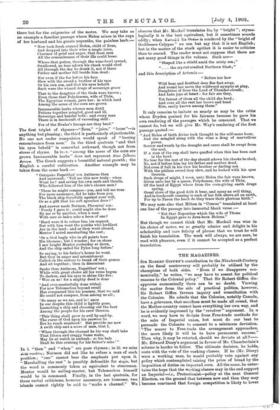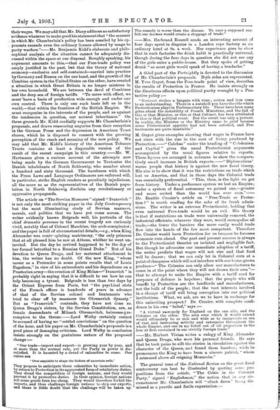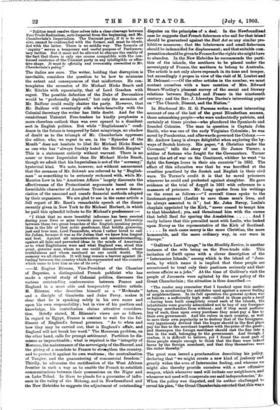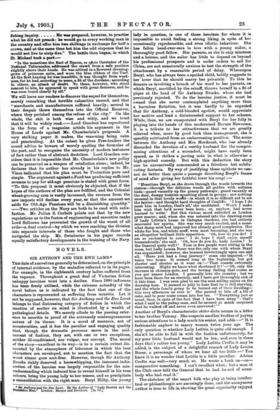THE MAGAZINES.
San ROBERT GIFFEN'S contribution to the Nineteenth Century. on the fiscal controversy will probably be utilised by the champions of both sides. "Even if we disapprove eco- nomically," he writes, "we may have to assent for political reasons to the Colonial policy." That Sir Robert Giffen dis- approves economically there can be no doubt. Viewing the matter from the side of practical politics, however,. Sir Robert Giffen favours inquiry and consultation with the Colonies. He admits that the Colonies, notably Canada,. have a grievance, that sacrifices must be made all round, that the Mother-country cannot have everything her own way, and he is evidently impressed by the " revolver " argument. In a word, we may have to deviate from Free-trade methods for the sake of Imperial union, but must do our best to persuade the Colonies to consent to a minimum deviation. "The nearer to Free-trade the arrangement approaches, the more likely it will be to have permanent success." Then why, it may be retorted, should we deviate at all P— Mr. Edward Dicey's argument in favour of Mr. Chamberlain's scheme is harder to follow. The ultimate decision, he holds, rests with the vote of the working classes. If he (Mr. Dicey) were a working man, he would probably vote against any policy which contemplated raising the price of bread by the imposition of duties on imported corn. All the same, he enter- tains the hope that the working classes may in the end support an Imperial—i.e., Protectionist—policy at the next General Election, on the ground that between now and then they may become convinced that foreign competition is likely to lower
their wages. We may add that Mr. Dicey adduces no satisfactory evidence whatever to make good his statementthat "the manner . in which Mr. Chamberlain's policy has been assailed by his op , ponents exceeds even the ordinary licence allowed by usage to party warfare."—Mr. Benjamin Kidd's elaborate and philo- sophical analysis of the situation cannot be adequately dis- cussed within the space at our disposal. Roughly speaking, his argument amounts to this,—that our Free-trade policy was • amply justified in the past, bet that the theory of national economy--exclusive and self-contained--carried into practice by Germany and Russia on the one hand, and the growth of the . Combine system in the United States on the other, have created a situation in which Great Britain is no longer mistress in • her own household. We are between the devil of Combines and the deep sea of foreign tariffs. "To move with effect, we must have a basis of production wide enough and under our own control. There is only one such basis left us in the world,—that within the frontiers of the British Empire. We must reorganise in the interests of the people, and as against the tendencies in question, our natural inheritance." On these grounds Mr. Kidd cordially supports Mr. Chamberlain's proposals, and draws reassuring auguries from their reception in the German Press and the depression in American Trust shares, which he is disposed to connect with the growing perception of the reach and meaning of the new policy. We may add that Mr. Kidd's history of the American Tobacco Trusts contains at least a disputable version of the result of the recent campaign in this country.—Mr. W. Hartmann gives a curious• account of the attempts now being made by the German Government to Teutonise the Danish inhabitants of North Schleswig, who number about a hundred and sixty thousand. The harshness with which the Press Laws and Language Ordinances are enforced will, in particular, strike English readers as peculiarly injudicious, all the more so as the representatives of the Danish popu- lation in North Schleswig disclaim any revolutionary or aggressive propaganda.
The article on "The Servian Massacre" signed " Ivanovich " is not only the most striking paper in the July Contemporary but the most illuminating study of Servian manners, morals, and politics that we have yet come across. The writer evidently knows Belgrade well, his portraits of the chief dramatis personae in the recent tragedy are curiously .vivid, notably that of Colonel Maschine, the arch-conspirator; and the paper is full of circumstantial details,—e.g., when -King Alexander was conte-iplating matrimony, "the only princess that at all pleased him he saw at Athens, whither he went un- invited. But the day he arrived happened to be the day of her formal betrothal to a Russian Grand Duke." But of his devotion to Queen Draga, and her maternal attachment to him, the writer has no doubt. Of the new King, "whose career as a Pretender in some points recalls that of Louis Napoleon," in view of his antecedents and his dependence on a Praetorian army—the creation of King Milan—" Ivanovich " is probably right in saying that it is difficult to see how he can help becoming a tyrant. Belgrade is less than two days by the Orient Express from Paris, but "the psychical state of the French officer is hundreds of years in advance of that of the Servian colonel and lieutenants who tried to clear off by massacre the Ohrenovich dynasty." But as " Ivanovich" contends, they have not done so. Queen Draga's sisters, by the Servian Constitution, are, as female descendants of Milosch Obrenovitch, heiresses-pre- sumptive to the throne.—Lord Welby certainly cannot be accused of having no "settled convictions" on the question of the hour, and his paper on Mr. Chamberlain's proposals is a good piece of damaging criticism. Lord Welby in conclusion insists strongly on the gratuitous nature of the proposed change :— " Our trade—import and export—is growing year by year, and at more than the normal rate, yet the Party in power is dis- satisfied. It is haunted by a dread of calamities to come. Our rulers are
' Over exquisite to shape the fashion of uncertain evils.'
They propose to anticipate these calamities by immediate action, by return to Protection in its aggravated form of retaliatory duties. They dread the competition of foreign nations, and they would Prevent it by protective duties. In their opinion, foreign nations !ell some goods here too cheap. They would therefore forbid the imports, and thus challenge foreign nations to stop our exports, and there is little doubt that the challenge will be taken up.
The remedy is worse than the disease. To cure a supposed sur- feit onr doctors would create a stoppage of trade."
—Mrs. Herbrand Russell sends an interesting account of four days spent in disguise in a London rope factory as an ordinary hand at 8s. a week. Her experience goes to show that in such factories the drink habit is practically universal,
though during the four days in question she did not see any of the girls enter a public-house. But they spoke of getting drunk "as most girls would speak of having a headache."
A third part of the Fortnightly is devoted to the discussion of Mr. Chamberlain's proposals. Both sides are represented. M. Yves Guyot, from the Free-trade point of view, describes the results of Protection in France. He insists strongly on the disastrous effects upon political purity wrought by a Pro- tective policy " Beetroot strikes a bargain with wine ; cotton and iron come to an understanding. There in a nutshell you have the role which Protectionism plays in Parliamentary life. There have been many gibes about the instability of French Ministries, and the fall of this or that Minister, or this or that Cabinet, has been attributed to this or that political event. But the event was only a pretext. In reality, the Minister or the Ministry came to grief because some Protectionist appetite had not been satisfied, and Pro- tectionists are quite insatiable."
M. G-uyot gives examples showing that wages in France have not risen with the rise in the cost of living produced by Protection.—" Calehas " under the heading of " CoMenism and Capital" gives the usual Protectionist arguments accompanied by the usual figures relative to exports. These figures are arranged in columns to show the compara-
tively small increase in British exports.—" Diplomaticus' warns people that history is against the new fiscal theory.
His aim is to show that it was the restrictions on trade which lost us America, and that in those days the Colonial trade was essentially preferential. "This, then, is the light we get from history. Under a preference system we lost an Empire ; under a system of fiscal autonomy we gained one,—greater and more united than the world has ever seen."— Dr. Beattie Crozier's article on "Free-Trade or Protec- tion ? " is worth reading for the sake of its frank admis- sions. The writer is an extreme Protectionist, holding that even universal Free-trade would be an evil. His theory is that if restrictions on trade were universally removed, the industrial efficients, wherever they were, would monopolise all trade,—the fewer the barriers the more easily would trade flow into the hands of the few most competent. Therefore Dr. Crozier would have Protection for us because he foresees economic rain ahead. Our past and present success is always to the Protectionist theorist an isolated and negligible fact. But though he advocates our immediate adoption of a tariff, the writer predicts that wages will not rise and that food will be dearer; that we can only let in Colonial corn at a point of cheapness which will not interfere with our home-grown produce—" The Colonies can only allow our manufactures to come in at the point where they will not drown their own "- that to attempt to unite the Empire with a tariff cord for purposes of defence is hopeless ; that the people who will benefit by Protection are the landlords and manufacturers, not the bulk of the people ; that the vast interests involved in a change of tariff will bring corruption into our political institutions. What, we ask, are we to have in exchange for this uninviting prospect? Dr. Crozier, with complete confi- dence in his own "belief," says :—
" A virtual monopoly for England on the one side, and the Colonies on the other. The area over which it would extend would ultimately be so rich and wide as to inaugurate an era of vast and increasing activity and enterprise throughout the whole Empire, and one in my belief out of all proportion to the lose at first sustained in our strictly foreign trade.'
—Mr. Herbert Vivian writes a eulogy of King Alexander and Queen Draga, who were his personal friends. He says that he took pains to sift the stories in circulation against the character of the Queen, and found them baseless; while he pronounces the King to have been a sincere patriot, "whom I esteemed above all reigning Monarchs."
The general tone of the National Review on the great fiscal controversy can best be illustrated by quoting some pro- positions from the article, "The Crisis in the Unionist Party," signed "Englishman," the notion that in any cir- cumstances Mr. Chamberlain will "climb down" betas dis- missed as a puerile and futile expectation:— "Politics must resolve their.selves into a clear cleavage between Free Trade Radicalism, anti-Imperial from the beginning, and Mr. Chamberlain's Imperialism. The Unionist party, if it is to sur- vive, cannot be confounded with the former, and must be identi- fled with the latter. There is no middle way. The formula of ` inquiry ' serves a temporary and useful purpose of Parliamen- tary tactics. But it must not be allowed to obscure the reality of the fact that there is only one course compatible with the con- tinued existence of the Unionist party in any intelligible or effect- tire shape. It must be officially and irrevocably committed to Mr. Ciscsraber/ain's policy."
The italics are ours. The writer, holding that disruption is inevitable, considers the question to be how to minimise the extent and consequences of that misfortune. He con- templates the secession of Sir Michael Hicks Beach and Mr. Ritchie with equanimity, that of Lord Groschen with regret. The possible defection of the Duke of Devonshire would be "profoundly deplored," but only the secession of Mr. Balfour could really shatter the party. However, that Mr. Balfour will eventually side whole-heartedly with the Colonial Secretary the writer has little doubt. And for the recalcitrant Unionist Free-traders he kindly prophesies a more cheerless outlook than was ever opened to a dissident sect in English politics. But while " Englishman's " confi- dence in the future is tempered by faint misgivings, no shadow of doubt as to the triumph of Mr. Chamberlain oppresses the editor, who, we regret to see, in the "Episodes of the Month" does not hesitate to libel Sir Michael Hicks Beach as one who has "always frankly hated the British Empire." This is a statement entirely without warrant. There is no saner or truer Imperialist than Sir Michael Hicks Beach, though we admit that his Imperialism is not of the " screamy," hysterical kind. We note, however, not without amusement that the menaces of Mr. Schwab are referred to by " English- man " as something to be seriously reckoned with, while Mr. Maurice Low in his "American Affairs" largely discounts the effectiveness of the Protectionist arguments based on the formidable character of American Trusts by a severe denun- ciation of the unsound and unsafe financial methods adopted by their organisers. We are glad to see in the same article a full report of Mr. Root's remarkable speech at the dinner recently given in New York to Sir Michael Herbert, in which he paid this splendid tribute to Sir Michael's predecessor :—
" I think that no more beautiful influence has been exerted during your lives or mine towards peace and good fellowship between these two great branches of the English-speaking people than in the life of that noble gentleman, that kindly, generous, just and true man, Lord Pauncefote, whom I rather loved to call Sir Julian, because it was as Sir Julian that we knew him longest and best. Against all misconstruction and misunderstanding, against all false and perverted ideas in the minds of Americans as to what Englishmen were and what England was, stood this great, genuine man, whom no one could misunderstand, whose truthfulness and whose manhood no one could doubt. His memory we all cherish. It will long remain a barrier against ill- feeling between the country which he represented and the country which came to love him as one of its own."
—M. Eugene Etienne, Vice-President of the Chamber of Deputies, a distinguished French publicist who has made a special study of Colonial politics, discusses the various outstanding controversies between France and England in a most able and temperately written article. M. Etienne, who describes himself as a " Moderate " and a disciple of Gambetta and Jules Ferry, makes it dear that he is speaking solely in his own name and upon his own responsibility ; but in view of his position and knowledge, his contribution claims attentive considera- tion. Briefly stated, M. Etienne's views are as follows. In regard to Egypt, France is content to wait for the ful- filment of England's formal promises. "As to when and how they may be carried out, that is England's affair, and England will not break her word." The Moroccan problem, on the other hand, calls for prompt settlement. Partition he dis- misses as impracticable ; what is required is the "integrity of Morocco, the maintenance of the sovereignty of the Shereef, and the giving of a mandate to France to stresigthen the country, and to protect it against its own weakness ; the neutralisation of Tangier, and the guaranteeing of commercial freedom" Thirdly, he advocates the rectification of the West African frontier in such a way as to enable the French to establish communications between their possessions on the Niger and on Lake Tchad. In Siam he pleads for a guarantee of influ- ence in the valley of the Mekong, and in Newfoundland and the New Hebrides he suggests the adjustment of outstanding disputes on the prinoiples of a deaL In the Newfoundland case he suggests that French fishermen who sail for that island should be guaranteed against the Bait Act or any similar pro- hibiti ve measures ; that the lobstermen and small fishermen should be indemnified for displacement; and that suitable com- pensation should be given to France for the rights she might have to abandon. In the New Hebrides he recommends the parti- tion of the islands, the southern to be placed under the sovereignty of France, the northern to belong to Australia.
The article is not only above reproach in its tone and temper, but exceedingly a propos in view of the visit of M. Loubet and M. Delcasse.—Of the other articles in the number, we must content ourselves with a bare mention of Mrs. Edward Stuart-Wortley's pleasant survey of the social and literary relations between England and France in the nineteenth century; and the Rev. J. Llewelyn Davies's interesting paper on "The Church, Dissent, and the Nation."
In Blackwood Mr. H. G. Parsons writes a most interesting account of one of the last of the great Elizabethan seamen, those astonishing people—who were undoubtedly patriots, and certainly at times pirates—who plundered the Spaniards and founded Colonies. The man in question is Captain John Smith, who was one of the early Virginian Colonists ; he was saved by Pocahontas, and afterwards governed the Colony.— Mr. Andrew Lang is always delightful when exploring the by- ways of Scotch history. His paper, "A Christian under the Covenant," tells the story of one Sir James Turner, a soldier of fortune who fought for the Covenanters. Turner learnt the art of war on the Continent, whither he went "to fight the foreign loons in their ain countrie in 1632. The
effect of this education was that he was horrified at the cruelties practised by the Scotch and English in their civil wars. To Turner's credit it is that he saved prisoners wherever he could and protested against slaughter. He gave evidence at the trial of Argyll in 1661 with reference to a massacre of prisoners. Mr. Lang quotes from his writings on the event as follows I several times spoke to the lieutenant-general (Leslie) to save those men's lives, and he always assented to it" ; but Mr. John Nevoy, Leslie's chaplain appointed by the Kirk, "never ceased to tempt him to that bloodshed; yea, and threatened him with the curses that befell Saul for sparing the Arealekites And I verily believe that this prevailed most with Leslie, who looked upon Nevoy as the representative of the Kirk of Scotland.
In such cases mercy is the more Christian, the more honourable, and the more ordinary way, in our wars in Europe."
" Gulliver's Last Voyage," in the Monthly Review, is another instance of the wits being on the Free-trade side. This imitation of Swift opens with a clever description of the
"Internecine Islands," among which is the island of "Joc,o- seria, by which name it is implied that these people are accustomed to treat only their pastimes seriously and their serious affairs as a joke." At the time of Gulliver's visit the people of Jocoseria were agitated by the new policy of the Great Chamberlain ; the situation is thus described :—
"The reader may remember that I touched upon this matter before, in mentioning the antidotes used against a nearer feeling of neighbourliness. In its full operation the general system was as follows : a sufficiently high wall—called in those parts a tariff —having been built completely round eaoh of the islands, the inhabitants were gravely admonished not to buy of any foreigner bringing merchandise from without : and if they must perforce buy of such, then upon every purchase they must pay a fine to their own government. And the rulers in each country, as well to save their own popularity as to destroy that of the foreigners, very ingeniously devised that the buyer should in the first place pay his fine to the merchant together with the price of the goods ; and thereupon the foreign merchant should cast the fine into a box in the wall, belonging to the government. And though, I confess, it is difficult to believe, yet I found the most part of these people simple enough to think that the fines were indeed borne by the foreign merchant, and that they themselves were the richer thereby.'
The great man issued a proclamation describing his policy, declaring that "we might create a new kind of jealousy and greatly widen the area of Internecine feeling, and whereas we might also thereby provide ourselves with a new offensive weapon, which whenever used will irritate our neighbours, and whenever not used will exasperate our said independencies," Ste. When the policy was disputed, and its author challenged to reveal his plan, "the Great Chnmberlain retorted that this was a
fishing inquiry He was prepared, however, to practise what he did not preach: he would go to every working man in the country and offer him two shillings in exchange for half a
crown, and at the same time bet him the odd sixpence that he would not live to sixty-five." The battle then began, in which St. Michael took a part:— " In the meantime the Earl of Epsom, ez officio Caretaker of the National Tabernacles, addressed the crowd from a safe position slightly above their heads. He was attired in a flowered dressing- gown of primrose satin, and wore the blue ribbon of the Turf. At the first hearing he was inaudible, it was thought from weak- ness, for he had, according to some, a fit of the durdans ; according to others, an attack of doubt To those, however, who stood nearest to him, he appeared to speak with great firmness, and he was soon heard clearly by all."
We will leave our readers to discover the sequel for themselves, merely remarking that terrible calamities ensued, and that "merchants and manufacturers suffered heavily ; several in their despair threw themselves into the Official Receiver,
where they perished among the refuse of the city." On the whole, the skit is both wise and witty, and we trust that it will be widely read.—Lord Goschen' has reproduced in the form of a magazine article his argument in the House of Lords against Mr. Chamberlain's proposals. A very striking paper it makes, the reasoning being calm and penetrating. At the outset he gives Free-traders the sound advice to beware of merely quoting the formulas of the past, and to recognise the necessity of modern instances of fact rather than of abstract doctrines. Lord Goschen con- siders that it is impossible that Mr. Chamberlain's new policy can be preserved as a weapon of retaliation alone ; indeed, he declares that its author has already in his replies to Mr.
Vince indicated that his plan must be Protection pure and simple. The argument against a Food-tax producing sufficient revenue to pay for old-age pensions is stated with great force.
"To this proposal it must obviously be objected, that if the hopes of the authors of the plan are fulfilled, and the Colonial wheat-growing area is vastly increased, the revenue from the new imposts will decline every year, so that the amount set aside for Old-Age Pensions will be a diminishing quantity."
—Two articles on the Navy are both to be read with satis- faction. Mr. Julian S. Corbett points out that by the new regulations as to the fusion of engineering and executive ranks Lord Selborne has prevented the growth of the worst of all evils—a dual control—by which we were reaching the division into separate interests of those who fought and those who navigated the ship. Mr. Swinburne in his paper records equally satisfactory developments in the training of the Navy.













































 Previous page
Previous page